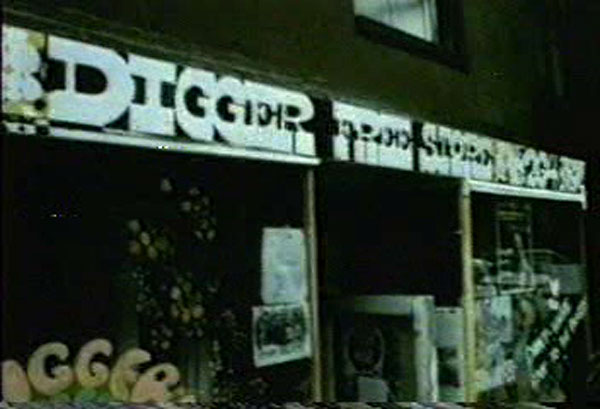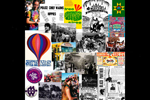Free Store (New York)
New Yorker, Oct. 14, 1967, p. 49.
"Talk of the Town"
[Ed. note: This article mentions "Richie" as one of those in the New York
Free Store. This is undoubtedly the same Motorcycle Richie who plays an
important role in the John Simon novel about the Diggers, Sign of the Fool.]
THE Diggers' Free Store is a small ground-floor shop at 264 East Tenth
Street, between First Avenue and Avenue A, and its name is a simple description,
not an advertising come-on. Diggers are hippies who help other hippies, so
everything in the Free Store is given away. During its regular business hours
(from one in the afternoon until nine at night, Mondays through Saturdays), the
shop is crowded with Negro and Puerto Rican children, old women speaking Middle
European dialects, barefoot runaways with glazed eyes, stumbling winos, and
gaily ornamented hippie couples, all picking through boxes full of used shoes or
fingering racks of soiled clothing or burrowing under piles of miscellaneous
junk spread out on rough wooden tables, which line the walls. In one window, a
bright-colored hand-lettered sign reads, "DON'T WASTE. GIVE TO THE
DIGGERS." The store has been open two weeks, and contributions have
included a pair of crutches, a litter of gray-and-white kittens, a broken
motorcycle, and five television sets in working order. Some of the contributors
are relatively well-off uptown or West Village types; others are local
housewives, hippies, and Negro and Puerto Rican children. The store virtually
runs itself, but the people who started it—four self-proclaimed Diggers who
identify themselves merely as Clyde, Susan, Diego, and Richie—maintain an
office of sorts in an incredibly cluttered room behind the shop proper. There
they worry about such relatively long-range problems as how to raise enough
money to pay the rent (a hundred and seventy-five dollars a month), meet the
gas, electric, and telephone bills, and buy vegetables for the famous Digger
stew, which is made daily in a huge white-enameled pot in a kitchen behind the
office, and is ladled out—free, of course—to anyone who wants it every
afternoon around five o'clock in Tompkins Square Park. When Clyde, Susan, Diego,
and Richie are asked to explain why they are performing these services for the
lower East Side community, each repeats the enigmatic Digger motto:
"Diggers do."
Clyde is eighteen years old. He comes from Gadsden, Alabama, and has been
more or less on the road since his thirteenth birthday. He stands six feet
three, weighs two hundred pounds, has medium-length red hair, and is
clean-shaven. His body is decorated with forty-two tattoos, mostly self-applied.
He claims that he once ran a tattoo parlor in New Orleans, and made as much as
five hundred dollars a week in it during Mardi Gras. Why did he give it up?
"Why does anyone do anything?" he says. He met Richie out in San
Francisco, where they were both "sort of connected with the Hell's
Angels." He was forced to sell his motorcycle in Las Vegas when the cops
arrested him as a "disorderly person." "My hair was longer
then," he explains. He is one of eleven children; his father is a house
painter. He drops in on his family whenever he happens to pass through Atlanta,
where they now live. He speaks in a pleasant, faded drawl, and smiles easily. He
wears black chino pants, black boots, and an Army shirt with a pfc.'s stripe on
the sleeve. He is not worried about the draft, because of his police record.
"And, if nothing else, this'll do it," he says, displaying a black
swastika tattooed on the inside of his right forearm. "Lots of people don't
know the war is over," he adds. "Three people have attacked me because
of this. It blows minds. A good bike rider blows minds. If you can't blow minds,
you can't be ‘righteous.’" When customers at the Free Store become
obstreperous, he throws them out. "We get a lot of winos," he says.
"You know how winos are. They see a crowd and they want to give their
speech: ‘I was deprived of this and that, and that is why I'm what I
am.'" At the end of the day, he helps clean up the store. "You won't
believe what a mess this is every evening," he told us. He is getting
married next month to a girl named Hilda Hoffman. "It's a bike
wedding," he says. "Everyone will come on bikes and take off afterward
for a party."
Susan is twenty-one years old. She comes from Detroit, where her father is a
tool-and-die maker. She ran away from home at eighteen and went to Chicago,
where site lived with a group of hippies. "I scrounged food for ten people
a day," she said. Like Clyde, she met Richie in San Francisco, where she
lived "in a real barn." Richie told her, "I'm taking you
away," but she said no, so he headed for New York on his motorcycle but got
locked up in Las Vegas for twenty-one days and had to come back to San
Francisco. The next time, she left with him. They have been "going
steady" for six months, and are planning to be married in a double ceremony
with Clyde and Hilda. She has blue eyes, brown hair, and a pale skin, and wears
a Mexican riding blouse of white muslin unbuttoned down the front to reveal a
purple T-shirt with a silk-screened portrait of "the Zig-Zag man,"
done by a West Coast poster artist. On her head she wears a
"Rigoletto" hat of dark-red velvet, with dyed ostrich plumes, which
she found in a carton of contributions from a theatrical-costume shop. A
handsome Weimaraner hound spends most of his time sitting at her feet.
"That's Cigar. He's two years old and has genuine Digger fleas," she
told us. On most afternoons, she ladles out tile Digger stew in Tompkins Square
Park. She says that the most important thing in life is to remember that
"you’re free to do whatever you want to do."
Diego is forty-four years old. He is from Indianapolis, and has
deep-reddish-brown hair and a bushy beard. He knew Clyde in New Orleans ("I
know people everywhere"), and he came to New York in June. He cooks
the Digger stew, in a thirty-two-quart pot on a gas range in the Free Store’s
kitchen. "I can do just about anything in a kitchen that needs to be
done," he says. "I've been all around the country, and the best place
to get a job when you're hungry is in a restaurant." The meat for his stew—beef
trimmings or ham hocks or "perfectly good" wieners or sausages with
ripped casings–is donated by a local wholesale butcher. "There's enough
good food wasted around town in a day to feed half the country," he told
us. Besides meat, he throws into the pot whatever fresh vegetables are in season—carrots,
potatoes, celery, lettuce, tomatoes, onions, garlic—and "lots of
spices." Every morning, the Diggers pick up a huge bag of day-old rolls at
Rapoport's Restaurant, on Second Avenue. The Diggers feed as many as fifty
people each weekday and up to a hundred a day on weekends. "We haven't
turned anyone away yet, but there's never any left over, either," Diego
said. "We’re going to have to go to two pots soon."
Richie is twenty-three years old. His father died when he was an infant. His
mother is a licensed real-estate broker on Long Island—"a real bourgeois;
she owns a Caddy." He hasn't seen her in years. "I have two pairs of
pants to my name," he says proudly. He wears a blue woolen cap; his hair,
which is dark, falls almost to his shoulders. He spent two years in a New York
State reform school and has been on the road since he was eighteen. He ran into
the Diggers in San Francisco, where he kept his motorcycle in a Digger garage.
Before long, he was using his bike to deliver Digger stew to Golden Gate Park.
He also got a look at four Free Stores that the Diggers have been operating in
San .Francisco, and he liked what he saw. "People ask, 'Why a free
store?'" he told us. "We tell them it's free because it's yours. Take
what you need. If you take more than you need, you'll know it. Every day they
tear this place apart, and every night we clean it up." He smiled one of
his rare smiles. "The Sanitation Department won’t remove our trash,
because they say we’re a commercial establishment." Richie doesn't
believe in city administrations in general, or in cops, but he has only praise
for Deputy Inspector Joseph Fink, the commander of the Ninth Precinct, whose men
patrol the lower East Side. "All the hippies dig Fink." Richie said to
us. "If anyone has to be a cop—if that's his thing—then he ought to be
like Fink." Richie sums up his own philosophy in a single sentence:
"Every human being's got a right to do his thing as long as it doesn't hurt
anybody else." But he adds, "I don't believe in throwing flowers if
someone's trying to take what's yours away from you. The Diggers say, 'I'm not
going to pay for your trip.'" He admits that he likes to "start
things up" and then move on. "I fluctuate between being a Digger and
an outlaw motorcycle rider," he says. Looking into the distant future, he
says that he may someday "buy some land in Marin County, in California,
when I can save up a couple thousand dollars—you know, settle down and become
a real bourgeois." |

|
Scenes from the New York Digger Free Store
Click on photos for larger versions.
|
 |
| |
|
| |
|
| |
|
|

